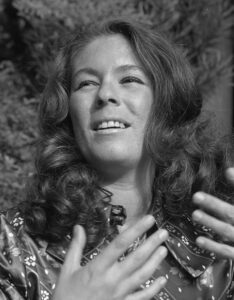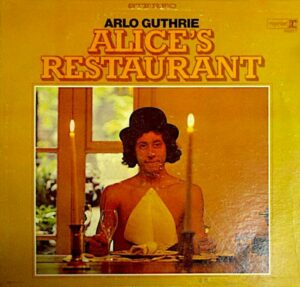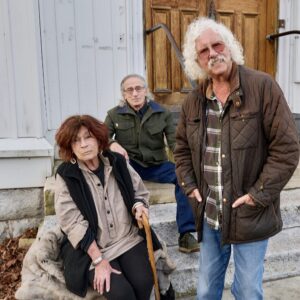By Sharon Oliver
Contributing Writer
GREAT BARRINGTON – Folk singer Arlo Guthrie’s timeless Thanksgiving anthem “Alice’s Restaurant” will forever have an even more special meaning. The octogenarian and longtime Provincetown resident who inspired the 1967 song, Alice Brock, passed away at the age of 83 just days shy of the 2024 Thanksgiving holiday, of chronic obstructive pulmonary disease.

Among those who paid the most humbling tribute was the folk singer himself, who wrote in a social media post through Rising Son Records, his music label based in Great Barrington.
“…Alice went into the restaurant business, and I began my years as an entertainer. We were, both in our own ways, successful,” said Guthrie. “As well as being a restauranteur, Alice also became an author, and an artist. We worked together on various projects. During the next few decades, we remained friends while our lives kept us busy. She was a no-nonsense gal, with a great sense of humor. … This coming Thanksgiving will be the first without her.”
Fateful meeting
Arlo Guthrie, son of famous folk singer Woody Guthrie, met Alice in 1962 when she was the school librarian at The Stockbridge School in Stockbridge, where he was a high school student. It is also where he met fellow student and musician Rick Robbins. In 1965, Guthrie and Robbins went to visit Alice and her husband Ray for Thanksgiving, and the rest is history.
The satirical 18-minute song “Alice’s Restaurant Massacree,” commonly known as “Alice’s Restaurant” is a talking blues that pays tribute to Alice, and is about that 1965 Thanksgiving visit. Alice and Ray Brock lived in a desanctified church that had been converted into a home while running The Back Room Restaurant nearby. Guthrie and Robbins helped clean out garbage from the Brocks’ property, which subsequently led to their arrests for illegally dumping trash over a cliff on private property because the trash dump was closed due to the holiday. The conviction was later believed to make Guthrie ineligible for the draft.

Anti-war protest
Guthrie used the story about the arrest and how it supposedly helped him get out of serving during the Vietnam War to turn the song into an anti-war protest song. In reality, his draft number never came up. His signature song, and the story behind it became a worldwide sensation, leading to a movie in 1969, several books, and a cookbook, as well as fame for Guthrie and the Brocks, who sold the church in 1971. Alice closed her last restaurant in 1979. In 1991, Guthrie purchased the church building and turned it into The Guthrie Center, a community center that offers cultural programs.
Alice Brock owned and operated three restaurants in the Berkshires—The Back Room, Take-Out Alice, and Alice’s at Avaloch—in succession between 1965 and 1979. She agreed to participate in the production of the film “Alice’s Restaurant,” including taking part in promotions and making cameo appearances in the film but declined to portray herself.
A final Thanksgiving together
Guthrie concluded his post: “Alice and my daughter, Annie, had spoken together recently and Alice, knowing her circumstances, approved an exhibit at the church to tell her own story. Alice and I spoke by phone a couple of weeks ago, and she sounded like her old self. We joked around and had a couple of good laughs even though we knew we’d never have another chance to talk together.
A couple of years ago, Alice, Rick and I went to Rick’s home for Thanksgiving dinner. Marti and I, along with a lot of old friends, celebrated 60 years of friendship. Some couldn’t be there, as time has taken its toll. But the spirit was all that mattered, and we got to celebrate it.
This year we get to add one more to those whose life we celebrate—an important one. Alice was a lifelong friend.”

Meanwhile, it has become a long tradition for many classic rock and adult album alternative radio stations to play the song every Thanksgiving. The memory of Alice Brock will live on.
RELATED CONTENT:
New Arlo Guthrie exhibit a highlight at Folk Americana Roots Hall of Fame
Greg Greenway continues the folk tradition with contemporary flair
Cambridge’s Club Passim helped launch the careers of many folk legends












